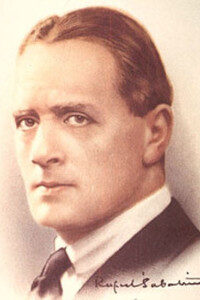Rafael Sabatini
Rafael Sabatini was born near the Adriatic seaport of Ancona, Italy to Anna Trafford, an Englishwoman, and Italian Vincenzo Sabatini, both of whom were well known opera singers. With their careers still in full swing and included much traveling, so baby Rafael was sent to her parents near Liverpool for a stable home life. After seven years they retired from opera and turned to being voice teachers and the boy rejoined them, first in Portugal where they set up their first music school, then back to Italy, where they settled in Milan.
By early adolescence Rafael had already been a voracious reader, with a particular fondness for romantic historical novels. He was schooled at Zug, Switzerland, but by 17 years of age he was well versed in some six languages and decided it was time to make his way in the world. His father stepped in and determined that Rafael's linguistic skill was best served in international commerce, so he was sent back to Liverpool in 1892--a logical decision, since he had family there and the city was Great Britain's largest commercial port. His knowledge of Portuguese came in especially useful in his company's dealings in Brazil, but after four years of business, Rafael's interest in writing was bubbling to the top. He was writing his own romance stories, which he believed to be more interesting than just reading the works of others. All of this work was in English, as he considered the best literature of the world to be in that language. Some of his work was submitted by an acquaintance to an editor and, and wound up being accepted and published by a Liverpool publisher. By 1899 he was selling short stories regularly to prominent magazines: Person's, London, and Royal. He also had a translation job as well, and by 1905 with two novels published, he decided to devote full time to writing. That same year he married Ruth Goad Dixon, the daughter of a Liverpool paper merchant. At that point Sabatini moved to London, the publishing hub of Britain.
Rafael produced, in addition to about a novel a year, a steady stream of short stories. By the time he published his first really interesting swashbuckler, "The Sea Hawk", in 1915 he had completed 12 novels and, although comfortable in his new living, he was not the success he had envisioned. Though he had a modest and loyal following and his historical research was of a high degree, Sabatini's earlier work could be rather uneven in subject matter, of special interest to him but not the public. For instance, his supposed illegitimacy may have led to his half-dozen books dealing with the illegitimate despot Cesare Borgia of early 16th-century Italy. He also sometimes hampered himself with heavy-handed historical constraints, dragged out with extraneous philosophizing, as well as stilted dialog--but some of these faults were characteristic of 19th- and early 20th-century novel writing style. He managed another novel for 1917, but through most of World War I he was working in as a translator for the British intelligence service--evidently of great import to the war effort (he had finally become a British citizen, due in no small part to Italy's continued threats to conscript him into the army).

